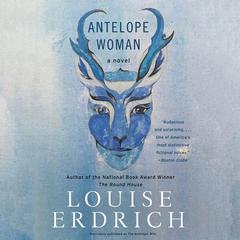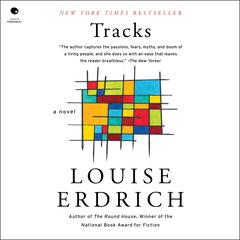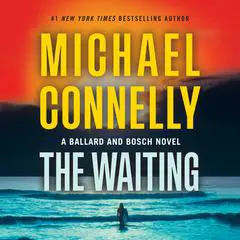 Play Audiobook Sample
Play Audiobook Sample
The Plague of Doves: A Novel Audiobook
 Play Audiobook Sample
Play Audiobook Sample
Quick Stats About this Audiobook
Total Audiobook Chapters:
Longest Chapter Length:
Shortest Chapter Length:
Average Chapter Length:
Audiobooks by this Author:
Publisher Description
A finalist for the Pulitzer Prize, The Plague of Doves—the first part of a loose trilogy that includes the National Book Award-winning The Round House and LaRose—is a gripping novel about a long-unsolved crime in a small North Dakota town and how, years later, the consequences are still being felt by the community and a nearby Native American reservation.
Though generations have passed, the town of Pluto continues to be haunted by the murder of a farm family. Evelina Harp—part Ojibwe, part white—is an ambitious young girl whose grandfather, a repository of family and tribal history, harbors knowledge of the violent past. And Judge Antone Bazil Coutts, who bears witness, understands the weight of historical injustice better than anyone. Through the distinct and winning voices of three unforgettable narrators, the collective stories of two interwoven communities ultimately come together to reveal a final wrenching truth.
Bestselling author Louise Erdrich delves into the fraught waters of historical injustice and the impact of secrets kept too long.
Download and start listening now!
"This was one of the most ambitious books I have read in a while. So many narrative threads. Erdrich tells the story of an entire town in North Dakota. She does this through a tangle of voices and histories. For the most part, the book is successful, but I did find it difficult at times to recognize points of view and remember how characters were related. The writing is fantastic, and separately, the stories are fascinating. I especially liked how she worked a fictionalized version of the real-life story of the lynching of Holy Track, and several other Nat. Am's, for murders they did not commit. That story alone, and the mystery she works around it, makes the entire novel well worth reading. She does the impossible, capturing our enmeshed, on and off-reservation American history."
— Rae (4 out of 5 stars)
Quotes
-
“Writing in prose that combines the magical sleight of hand of Gabriel García Márquez with the earthy, American rhythms of Faulkner…[Erdrich] has written what is arguably her most ambitious—and in many ways, her most deeply affecting—work yet.”
— New York Times -
“[Erdrich’s] accomplishment in these pages is Tolstoy-like: to render human particularity so meticulously and with such fierce passion as to convey the great, glittering movement of time.”
— San Francisco Chronicle -
“An intricate tale of heartbreak and humor…[A] wondrous novel…What marks these stories…is what has always set Erdrich apart and made her work seem miraculous: the jostling of pathos and comedy…Sit down and listen carefully.”
— Washington Post Book World -
“Wholly felt and exquisitely rendered tales of memory and magic…An intricate tapestry that deeply satisfies the mind, the heart, and the spirit.”
— O, The Oprah Magazine -
“The stories told by [Erdrich’s] characters offer pleasures of language, of humor, of sheer narrative momentum, that shine even in the darkest moments of the book.”
— Boston Globe -
“The great web that connects Erdrich’s vivid characters is so subtly drawn and so surprising in its configuration, the novel, like every good story, yields new insights and surprises with each immersion.”
— Chicago Tribune -
“Erdrich moves seamlessly from grief to sexual ecstasy, from comedy…to tragedy, and from richly layered observations of nature to human nature to magical realism. She is less storyteller than medium. One has the sense that voices and events pour into her and reemerge with crackling intensity, as keen music trembling between sorrow and joy.”
— Los Angeles Times -
“Erdrich’s latest novel…is so natural you forget there’s a writer behind it…Instantly gripping.”
— Marie Claire -
“One can only marvel…at Erdrich’s amazing ability to do what so few of us can—shape words into phrases and sentences of incomparable beauty that, then, pour forth a mesmerizing story.”
— USA Today -
“At once mythic and down-to-earth…Beautiful, funny, moving, and unexpected.”
— Elle -
“Erdrich deftly weaves past and present, and her literary territory is as intricate as Faulkner’s Yoknapatawpha County.”
— More -
“Erdrich has demonstrated a rare ability to create vibrant, wholly original characters and to describe nature in a prose so lyrical it becomes poetry. The Plague of Doves is proof that she has yet to exhaust her powerful magic.”
— Hartford Courant -
“To read Louise Erdrich’s thunderous new novel is to leap headlong into the fiery imagination of a master storyteller…A rich, colorful mosaic of tales that twist and turn for decades.”
— Miami Herald -
“A multigenerational tour de force of sin, redemption, murder and vengeance.”
— Publishers Weekly (starred review) -
“The magic lies in the details of Erdrich’s ever-replenishing mythology, whether of a lost stamp collection or a boy’s salvation. A lush, multilayered book.”
— Kirkus Reviews -
“Mesmerizing…With both impeccable comic timing and a powerful sense of the tragic, Erdrich continues to illuminate, in highly original style, ‘the river of our existence.’”
— Booklist (starred review) -
“Louise Erdrich’s imaginative freedom has reached its zenith—The Plague of Doves is her dazzling masterpiece.”
— Philip Roth, Pulitzer Prize–winning author
Awards
-
A New York Times bestseller
-
Winner of the AudioFile Earphones Award
-
A San Francisco Chronicle bestseller
-
Winner of the 2009 Anisfield-Wolf Book Prize for Fiction
-
A 2009 Pulitzer Prize Finalist for Fiction
-
A 2009 Audie Award Finalist
-
An ALA Notable Book Finalist for Fiction
-
A 2008 Christian Science Monitor Book of the Year for Fiction
The Plague of Doves Listener Reviews
-
" well-written with some beautiful phrases, this book is ridiculously ambitious in scope. though the character development is fantastic, the number of characters developed make the payoff an exercise in flipping back through the book, trying to find the clues. flawed, but worth reading. "
— Courtney, 2/13/2014 -
" Over the past 15+ years, I have read the vast majority of Louise Erdrich's novels. My fascination with Native American culture and the Native experience, along with my North Dakota pedigree, have drawn me to the characters and places (albeit mostly fictional) in Ms. Erdrich's writing; but it is that writing itself that has kept me coming back for more. The compelling way in which the characters lives intertwine, and the manner in which these relationships are revealed is nothing short of brilliant. (Even if I do sometimes have to backtrack to figure out how everything/everyone fits together.) The Plague of Doves may well be Louise Erdrich's best novel, but to know for sure, I will have to pick up the ones I have missed so far. "
— Sylvia, 2/7/2014 -
" Louise Erdrich is a great storyteller. You have to get used to her style, but I love how she weaves her stories and intertwines the lives of the Ojibwe indians and the german immigrants who settled in the area of North Dakota that Erdrich writes about. "
— Tess, 2/4/2014 -
" The first Louise Erdrich book I've ever read, and after that, I certainly will be reading more! "
— Autumn, 2/2/2014 -
" This is my first Louise Erdrich book, and I was definitely expecting more. I've only ever seen interviews with the author and loved her insight and perspective (especially as part of Bill Gates's Faces of American on PBS), so I was eager to enjoy her fiction. The Plague of Doves, however, should perhaps have been titled The Plague of Random Narratives. The story unfolds through a series of characters' perspectives, all centered on the town of Pluto, North Dakota, and loosely orbiting the unsolved mystery of a family's brutal murder in the early twentieth century. The central conflict however is so peripheral that when Erdrich returns to it at various points of the novel, I often had forgotten the pieces of the puzzles she had already given me. The disjointed narration too never fully comes together in a meaningful way, especially in the final chapter which didactically makes the connections that were missing in the early portions of the book. I respect the themes of lost history and struggles for identity that are present in the novel, especially in relation to the author's Native American perspective, but in the end the piece just doesn't work as a novel. "
— Mr., 1/30/2014 -
" I thought she was really just doing character sketches, word pictures, but not really much of a story---I was very wrong. "
— Bev, 1/27/2014 -
" I just could not get into this book. I really wanted to since the story seemed fascinating when I first heard about it. But no such luck. "
— Lomester, 1/25/2014 -
" This just wasn't one of her best. It didn't hold my attention, somehow the stories felt too disjointed from each other. Also it felt like a 'repeat' of some of her other books "
— Hollis, 1/16/2014 -
" This score is probably more a result of my disjointed reading than Erdrich's writing which is great as always. Having read this in spurts it took me a long time to figure out how everything was fitting together. "
— Carrie, 1/14/2014 -
" The entangling of stories was confusing at times. I enjoyed Erdrich's Master Butchers more. "
— Darlene, 12/29/2013 -
" Only got through 100 pages and was bored senseless. "
— Amie, 12/28/2013 -
" 1st 100 pages were a 2/3, but couldn't put it down after that - same character family as The Round House "
— Lindsay, 12/5/2013 -
" Interesting story and some chapters were quite gripping but overall, a bit hard to follow. "
— Sue, 5/22/2013 -
" This is better than the last few I've read. Multiple narration was a little uneven- the longest time was spent on the least interesting character, I thought. Her writing is always poetic and striking and this book is no exception "
— Ardyce, 9/1/2012 -
" The was the first (and probably the last) Louise Erdrich book that I have read. It had potential with the story of the main character, Evelina but the other narrators just cause confusion. Weird situations/stories occur that just ruin the book. "
— Ted, 3/18/2012 -
" I "get" the degrees of separation/the thread of characters related to a single story, but after awhile I quit caring about the characters and forgot what the underlying story was. "
— Laredo, 1/16/2012 -
" Ahh Louise Erdrich. Always a winner. This one even had a Queer lady character! "
— Jenn, 1/7/2012 -
" Plot? Louise may need some Ritalin....She is an excellant story teller and there are many excellant small stories included in the book that kept me reading until the end. "
— Emily, 1/6/2012 -
" Really weird and disjointed until the end. "
— Josh, 8/4/2011 -
" This book has just a mass of characters. They were all interesting and I felt robbed that I didn't get to know more about all of them. Instead of just little snippets of their lives, I wanted a book about each one. There were many that I wish I had actually met. I still want more! "
— Ella, 5/16/2011 -
" One of my favorite authors and I couldn't even finish the book. Sad. "
— Tonya, 5/10/2011 -
" well-written with some beautiful phrases, this book is ridiculously ambitious in scope. though the character development is fantastic, the number of characters developed make the payoff an exercise in flipping back through the book, trying to find the clues. flawed, but worth reading. "
— Courtney, 4/10/2011 -
" 2448 Listened to this, probably 2009.<br/><br/>Complicated multi-generational story of a community with its tensions between Indians and Caucasians. "
— Lily, 4/5/2011 -
" This author never fails to please. It is ironic that while her subjects are often tragic, her writing inspires. "
— Cindy, 3/21/2011 -
" I didn't like it; couldn't finish it. Maybe I'll try again someday but now's not the time. "
— Nancy, 3/15/2011 -
" really interesting, though more like a series of short stories than a novel, thought they are loosely tied to a single event. "
— Ben, 3/13/2011 -
" I really enjoyed this book. The characters were like puzzle pieces that you slowly pieced together. I've never read much with Native Americans as subjects but think I'll look for more by this author because I liked the characters so much. I definitely recommend. "
— Sunny, 3/6/2011 -
" I absolutely loved this book. I don't know how Erdrich manages to capture the perspectives of so many different characters in one novel, but she does it beautifully and honestly. I'd put this in the category of heartbreakingly beautiful. "
— Jprice7, 2/19/2011 -
" A masterful mix of bleakness and tenderness. "
— Pam, 2/9/2011
About Louise Erdrich
Louise Erdrich, a member of the Turtle Mountain Band of Chippewa, is a multiaward–winning author of New York Times bestselling fiction, as well as poetry, short stories, and children’s books. She has been a finalist for the Pulitzer Prize and has won the National Book Award, the National Book Critics Circle Award, and the Anisfield-Wolf Book Award. She has received the Library of Congress Prize in American Fiction, the prestigious PEN/Saul Bellow Award for Achievement in American Fiction, the Dayton Literary Peace Prize, the World Fantasy Award, and American Academy of Poets Prize, among others.
About the Narrators
Peter Francis James is an accomplished actor on both the stage and the screen. His theater credits include roles in On Golden Pond, Much Ado about Nothing, and August Wilson’s Gem of the Ocean. His many film and television credits include Jahfree Neema in Oz, Raymond Parks in The Rosa Parks Story, Joe Gould’s Secret, The Guiding Light, Law & Order: SVU, and Third Watch. James’ audiobook narration has won him nine AudioFile Earphones Awards.
Kathleen McInerney won the prestigious Audie Award for Best Narration in 2011 and was a finalist for the Audie in 2010 and 2015. Her narrations have also earned several AudioFile Earphones Awards. She has performed in New York and around the United States in both classical and contemporary theater. Her credits also include television commercials, daytime drama, radio plays, and a broad range of animation voice-overs.

































